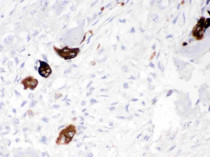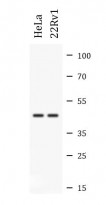ARG43117
anti-Cathepsin K antibody
anti-Cathepsin K antibody for IHC-Formalin-fixed paraffin-embedded sections,Western blot and Human
Overview
| Product Description | Rabbit Polyclonal antibody recognizes Cathepsin K |
|---|---|
| Tested Reactivity | Hu |
| Tested Application | IHC-P, WB |
| Host | Rabbit |
| Clonality | Polyclonal |
| Isotype | IgG |
| Target Name | Cathepsin K |
| Antigen Species | Human |
| Immunogen | Recombinant protein corresponding to A115-M329 of Human Cathepsin K. |
| Conjugation | Un-conjugated |
| Alternate Names | Cathepsin X; CTS02; CTSO; PYCD; Cathepsin O; PKND; EC 3.4.22.38; Cathepsin K; Cathepsin O2; CTSO1; CTSO2 |
Application Instructions
| Application Suggestion |
|
||||||
|---|---|---|---|---|---|---|---|
| Application Note | * The dilutions indicate recommended starting dilutions and the optimal dilutions or concentrations should be determined by the scientist. | ||||||
| Positive Control | HeLa and 22Rv1 | ||||||
| Observed Size | ~ 45 kDa |
Properties
| Form | Liquid |
|---|---|
| Purification | Affinity purification with immunogen. |
| Buffer | 0.2% Na2HPO4, 0.9% NaCl, 0.05% Sodium azide and 5% BSA. |
| Preservative | 0.05% Sodium azide |
| Stabilizer | 5% BSA |
| Concentration | 0.5 mg/ml |
| Storage Instruction | For continuous use, store undiluted antibody at 2-8°C for up to a week. For long-term storage, aliquot and store at -20°C or below. Storage in frost free freezers is not recommended. Avoid repeated freeze/thaw cycles. Suggest spin the vial prior to opening. The antibody solution should be gently mixed before use. |
| Note | For laboratory research only, not for drug, diagnostic or other use. |
Bioinformation
| Database Links | |
|---|---|
| Gene Symbol | CTSK |
| Gene Full Name | cathepsin K |
| Background | The protein encoded by this gene is a lysosomal cysteine proteinase involved in bone remodeling and resorption. This protein, which is a member of the peptidase C1 protein family, is predominantly expressed in osteoclasts. However, the encoded protein is also expressed in a significant fraction of human breast cancers, where it could contribute to tumor invasiveness. Mutations in this gene are the cause of pycnodysostosis, an autosomal recessive disease characterized by osteosclerosis and short stature. [provided by RefSeq, Apr 2013] |
| Function | Closely involved in osteoclastic bone resorption and may participate partially in the disorder of bone remodeling. Displays potent endoprotease activity against fibrinogen at acid pH. May play an important role in extracellular matrix degradation. [UniProt] |
| Cellular Localization | Lysosome. [UniProt] |
| Calculated MW | 37 kDa |
Images (2) Click the Picture to Zoom In
-
ARG43117 anti-Cathepsin K antibody IHC-P image
Immunohistochemistry: Paraffin-embedded Human osteosarcoma tissue stained with ARG43117 anti-Cathepsin K antibody at 1 µg/ml dilution.
-
ARG43117 anti-Cathepsin K antibody WB image
Western blot: HeLa and 22Rv1 whole cell lysates stained with ARG43117 anti-Cathepsin K antibody at 0.5 µg/ml dilution.







